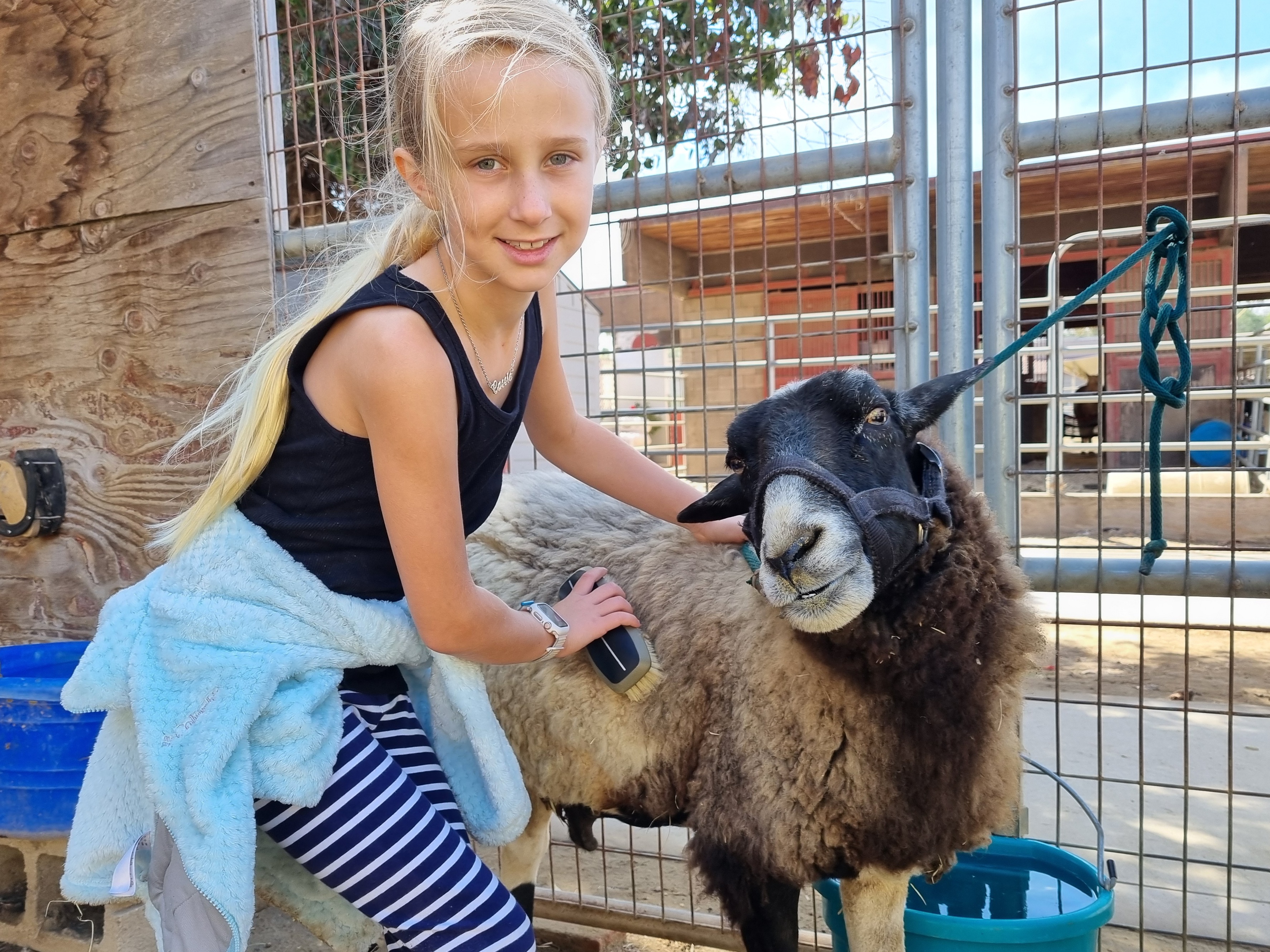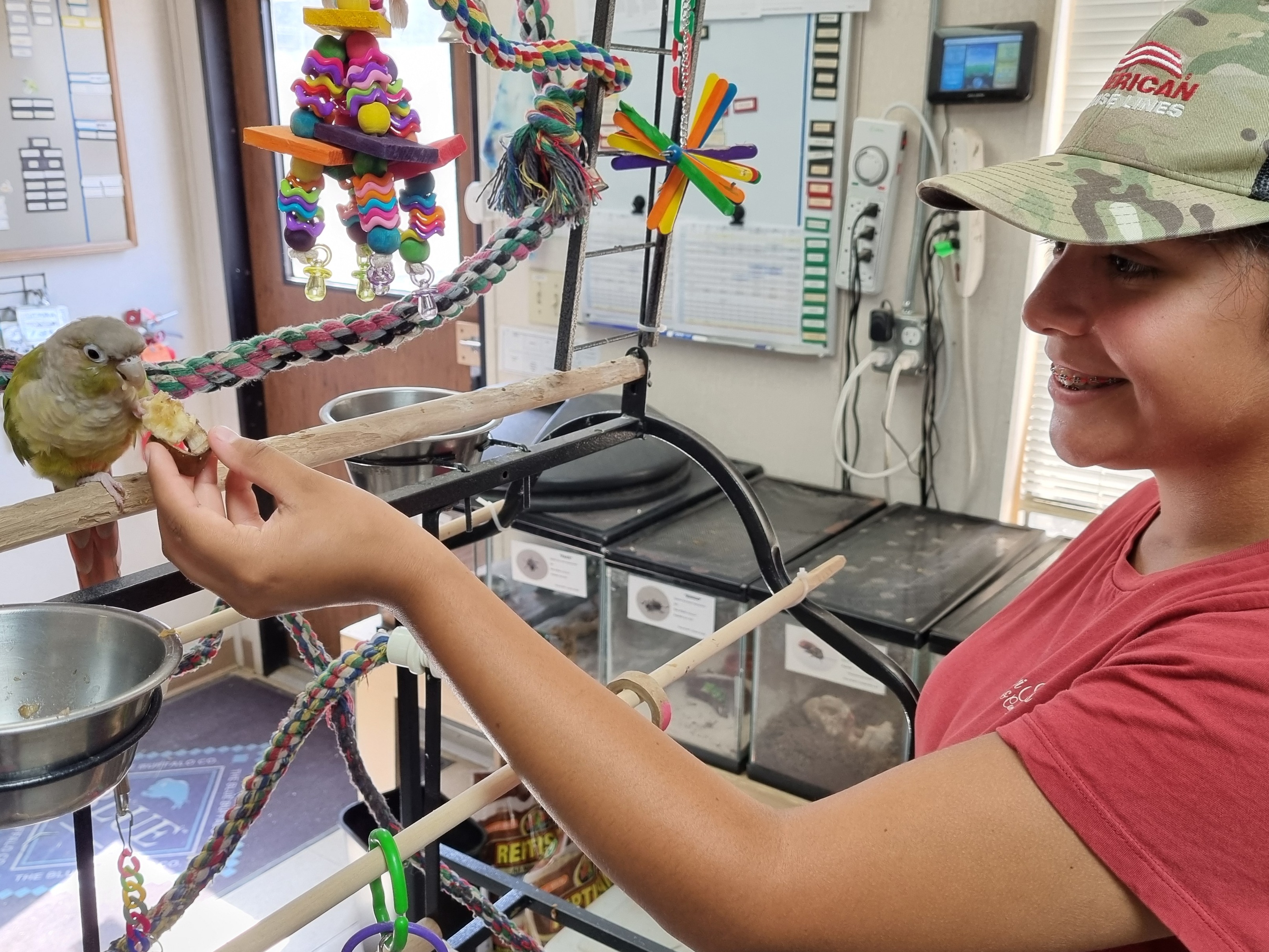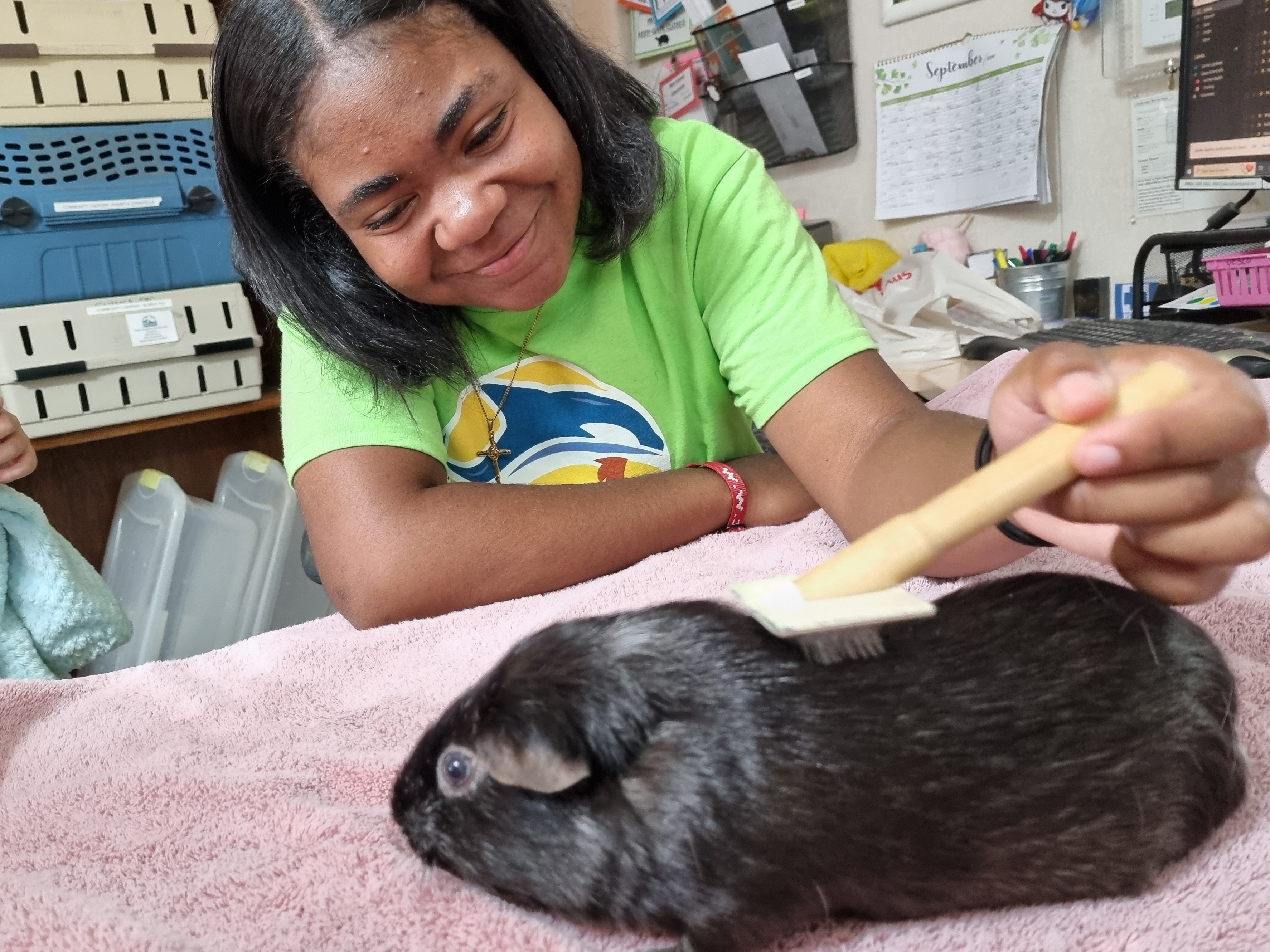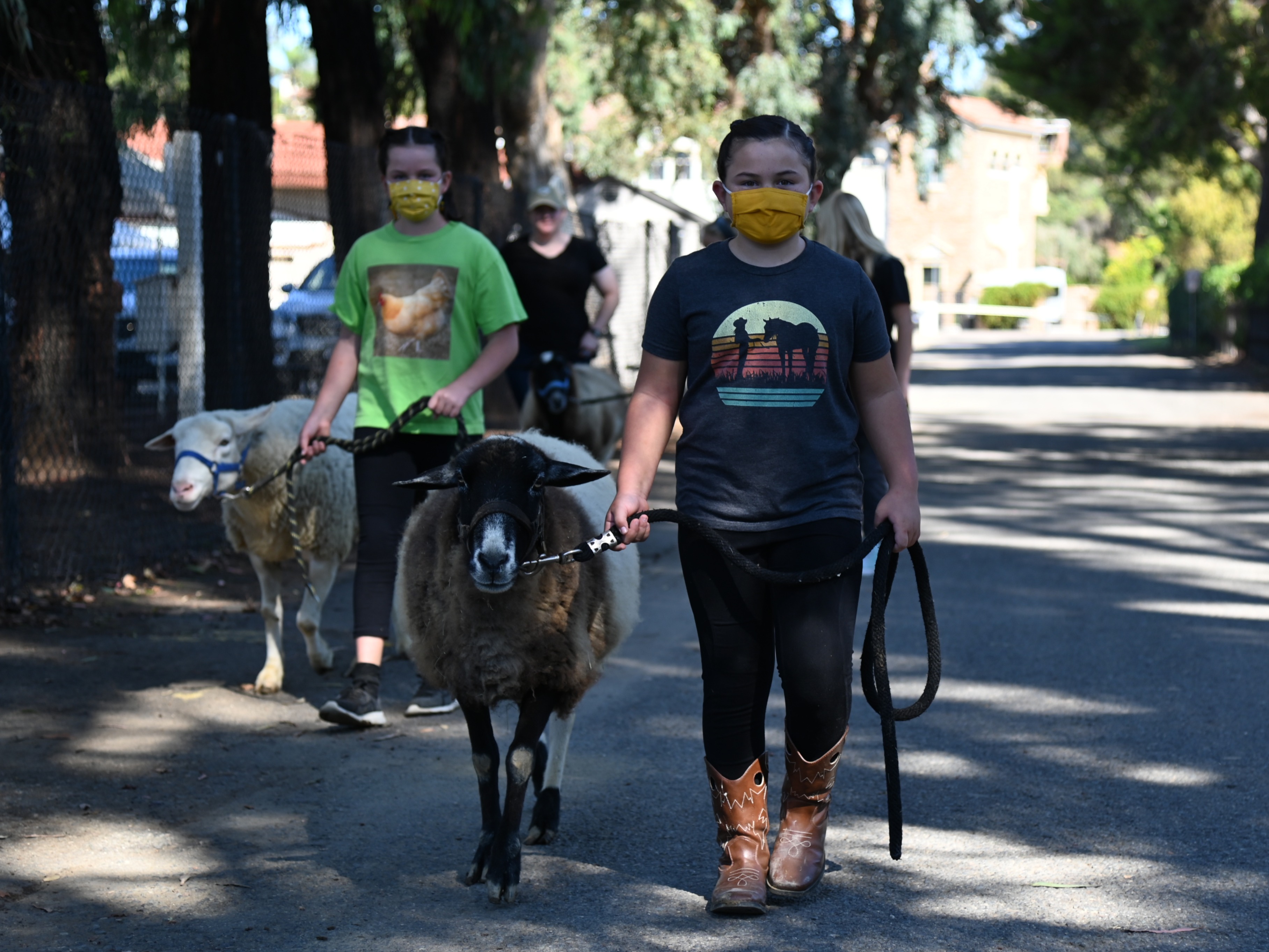



Introduction to Exotic Pet Care: Working with animals requires flexibility, patience, attentiveness and a strong work ethic. Our staff will explain and demonstrate how they care for 45 individual exotic pets.
Avians: Some birds have strong personalities and bond with only a few people, while others befriend everyone they meet. Adapting your care and handling techniques for each individual animal is especially important when working with these feathered friends. Campers will find out how to successfully interact with birds, maintain enclosures and perches, and learn about proper nutrition.
Reptiles: Do all animals eat every day? Could they possibly need daily cleaning and enrichment? Campers will discover the answer to those questions and practice cleaning, feeding and handling different types of reptiles.
Small Mammals: Rabbits, guinea pigs and chinchillas are absolutely adorable, but they do require a lot of care! They each have specific dietary needs that need to be followed carefully to ensure their health and well-being. The staff will show the group how to feed these cute critters.
Animal Training: In fields like ours, training animals is about a lot more than just teaching behaviors that we think are “cute.” Animal caretakers utilize training to make sure that the animals can handle routine health procedures with reduced stress. Natural animal behaviors are shaped to be on cue to also have positive experiences with the staff and the public; it’s a great form of enrichment, too! Campers will have a blast practicing this crucial part of animal care and learning the fundamentals of training and how that varies depending on the species at hand.
Introduction to Barn Animal Care: Just like the indoor animals, the barn animals that live outside need care and attention, too! The aspiring animal keepers will learn what it takes to maintain the health, cleanliness and enrichment for the lager species.
Sheep/Goats: Hands-on careers like zookeepers or barn attendants may not always be glamorous, but they sure are rewarding! One of the first steps in the morning is cleaning enclosures, and campers will get to experience the satisfaction of a cleaning job well done. Exercise is an important part of proper animal care because it keeps the animals at a healthy weight and provides an outlet to burn energy. Campers will get to practice exercising the sheep.
Mini Horses: Grooming is an important step of caring for animals because it allows for a physical inspection and routine handling that’ll help the animal be calm whenever medical treatments may be needed. Campers will get to practice grooming our miniature horses.
PM Feed: The staff will walk the campers through the end of day tasks that ensure our animals are safe and have what they need overnight. This includes checking food and water levels, general health and wellness, and securing enclosures. All good animal care industries have routine checks and procedures that help maintain animal health and safety.
Registration for this schedule starts on 12/05/2024 and ends on 02/23/2025
Participants must be 9 years to 16 years old when the program starts.
Introduction to Exotic Pet Care: Working with animals requires flexibility, patience, attentiveness and a strong work ethic. Our staff will explain and demonstrate how they care for 45 individual exotic pets.
Avians: Some birds have strong personalities and bond with only a few people, while others befriend everyone they meet. Adapting your care and handling techniques for each individual animal is especially important when working with these feathered friends. Campers will find out how to successfully interact with birds, maintain enclosures and perches, and learn about proper nutrition.
Reptiles: Do all animals eat every day? Could they possibly need daily cleaning and enrichment? Campers will discover the answer to those questions and practice cleaning, feeding and handling different types of reptiles.
Small Mammals: Rabbits, guinea pigs and chinchillas are absolutely adorable, but they do require a lot of care! They each have specific dietary needs that need to be followed carefully to ensure their health and well-being. The staff will show the group how to feed these cute critters.
Animal Training: In fields like ours, training animals is about a lot more than just teaching behaviors that we think are “cute.” Animal caretakers utilize training to make sure that the animals can handle routine health procedures with reduced stress. Natural animal behaviors are shaped to be on cue to also have positive experiences with the staff and the public; it’s a great form of enrichment, too! Campers will have a blast practicing this crucial part of animal care and learning the fundamentals of training and how that varies depending on the species at hand.
Introduction to Barn Animal Care: Just like the indoor animals, the barn animals that live outside need care and attention, too! The aspiring animal keepers will learn what it takes to maintain the health, cleanliness and enrichment for the lager species.
Sheep/Goats: Hands-on careers like zookeepers or barn attendants may not always be glamorous, but they sure are rewarding! One of the first steps in the morning is cleaning enclosures, and campers will get to experience the satisfaction of a cleaning job well done. Exercise is an important part of proper animal care because it keeps the animals at a healthy weight and provides an outlet to burn energy. Campers will get to practice exercising the sheep.
Mini Horses: Grooming is an important step of caring for animals because it allows for a physical inspection and routine handling that’ll help the animal be calm whenever medical treatments may be needed. Campers will get to practice grooming our miniature horses.
PM Feed: The staff will walk the campers through the end of day tasks that ensure our animals are safe and have what they need overnight. This includes checking food and water levels, general health and wellness, and securing enclosures. All good animal care industries have routine checks and procedures that help maintain animal health and safety.
Registration for this schedule starts on 12/05/2024 and ends on 05/18/2025
Participants must be 9 years to 16 years old when the program starts.
Introduction to Exotic Pet Care: Working with animals requires flexibility, patience, attentiveness and a strong work ethic. Our staff will explain and demonstrate how they care for 45 individual exotic pets.
Avians: Some birds have strong personalities and bond with only a few people, while others befriend everyone they meet. Adapting your care and handling techniques for each individual animal is especially important when working with these feathered friends. Campers will find out how to successfully interact with birds, maintain enclosures and perches, and learn about proper nutrition.
Reptiles: Do all animals eat every day? Could they possibly need daily cleaning and enrichment? Campers will discover the answer to those questions and practice cleaning, feeding and handling different types of reptiles.
Small Mammals: Rabbits, guinea pigs and chinchillas are absolutely adorable, but they do require a lot of care! They each have specific dietary needs that need to be followed carefully to ensure their health and well-being. The staff will show the group how to feed these cute critters.
Animal Training: In fields like ours, training animals is about a lot more than just teaching behaviors that we think are “cute.” Animal caretakers utilize training to make sure that the animals can handle routine health procedures with reduced stress. Natural animal behaviors are shaped to be on cue to also have positive experiences with the staff and the public; it’s a great form of enrichment, too! Campers will have a blast practicing this crucial part of animal care and learning the fundamentals of training and how that varies depending on the species at hand.
Introduction to Barn Animal Care: Just like the indoor animals, the barn animals that live outside need care and attention, too! The aspiring animal keepers will learn what it takes to maintain the health, cleanliness and enrichment for the lager species.
Sheep/Goats: Hands-on careers like zookeepers or barn attendants may not always be glamorous, but they sure are rewarding! One of the first steps in the morning is cleaning enclosures, and campers will get to experience the satisfaction of a cleaning job well done. Exercise is an important part of proper animal care because it keeps the animals at a healthy weight and provides an outlet to burn energy. Campers will get to practice exercising the sheep.
Mini Horses: Grooming is an important step of caring for animals because it allows for a physical inspection and routine handling that’ll help the animal be calm whenever medical treatments may be needed. Campers will get to practice grooming our miniature horses.
PM Feed: The staff will walk the campers through the end of day tasks that ensure our animals are safe and have what they need overnight. This includes checking food and water levels, general health and wellness, and securing enclosures. All good animal care industries have routine checks and procedures that help maintain animal health and safety.
Registration for this schedule starts on 12/05/2024 and ends on 09/28/2025
Participants must be 9 years to 16 years old when the program starts.
Introduction to Exotic Pet Care: Working with animals requires flexibility, patience, attentiveness and a strong work ethic. Our staff will explain and demonstrate how they care for 45 individual exotic pets.
Avians: Some birds have strong personalities and bond with only a few people, while others befriend everyone they meet. Adapting your care and handling techniques for each individual animal is especially important when working with these feathered friends. Campers will find out how to successfully interact with birds, maintain enclosures and perches, and learn about proper nutrition.
Reptiles: Do all animals eat every day? Could they possibly need daily cleaning and enrichment? Campers will discover the answer to those questions and practice cleaning, feeding and handling different types of reptiles.
Small Mammals: Rabbits, guinea pigs and chinchillas are absolutely adorable, but they do require a lot of care! They each have specific dietary needs that need to be followed carefully to ensure their health and well-being. The staff will show the group how to feed these cute critters.
Animal Training: In fields like ours, training animals is about a lot more than just teaching behaviors that we think are “cute.” Animal caretakers utilize training to make sure that the animals can handle routine health procedures with reduced stress. Natural animal behaviors are shaped to be on cue to also have positive experiences with the staff and the public; it’s a great form of enrichment, too! Campers will have a blast practicing this crucial part of animal care and learning the fundamentals of training and how that varies depending on the species at hand.
Introduction to Barn Animal Care: Just like the indoor animals, the barn animals that live outside need care and attention, too! The aspiring animal keepers will learn what it takes to maintain the health, cleanliness and enrichment for the lager species.
Sheep/Goats: Hands-on careers like zookeepers or barn attendants may not always be glamorous, but they sure are rewarding! One of the first steps in the morning is cleaning enclosures, and campers will get to experience the satisfaction of a cleaning job well done. Exercise is an important part of proper animal care because it keeps the animals at a healthy weight and provides an outlet to burn energy. Campers will get to practice exercising the sheep.
Mini Horses: Grooming is an important step of caring for animals because it allows for a physical inspection and routine handling that’ll help the animal be calm whenever medical treatments may be needed. Campers will get to practice grooming our miniature horses.
PM Feed: The staff will walk the campers through the end of day tasks that ensure our animals are safe and have what they need overnight. This includes checking food and water levels, general health and wellness, and securing enclosures. All good animal care industries have routine checks and procedures that help maintain animal health and safety.
Registration for this schedule starts on 12/05/2024 and ends on 11/02/2025
Participants must be 9 years to 16 years old when the program starts.
This one-day camp involves unique hands-on activities from our professional animal care staff to give campers experiences with the different aspects of animal husbandry. This includes: diet preparation, animal exercise, enrichment strategies, training sessions, and more. Campers will be encouraged to follow their passion and explore their skills with animals of all kinds, such as large and small mammals, reptiles, and birds. Spots are extremely limited, so register today!
Please contact Helen Woodward Animal Center if you have any questions.